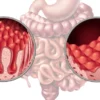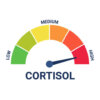
Living with Irritable Bowel Syndrome (IBS) can be unpredictable, with symptoms flaring up often, apparently without reason. This can initiate a search for something that not only brings relief but also potentially addresses the underlying issue. With the rise of alternative therapies, CBD (cannabidiol) has become a topic of increasing interest among those looking to manage chronic gut issues.
But does it actually help with IBS?
Let’s take a deep dive into the science, the stories, and what you need to know before trying CBD for gut health.
What is IBS?
IBS, or Irritable Bowel Syndrome, is a chronic functional gastrointestinal disorder that affects the digestive tract. It’s characterised by a cluster of symptoms, which can vary from person to person.
Common symptoms include:
- Abdominal pain or cramping
- Bloating and gas
- Diarrhoea, constipation, or alternating between the two
- Mucus in the stool
- Irregular bowel habits
While IBS doesn’t increase the risk of colon cancer, it can significantly affect quality of life. The exact cause isn’t fully understood, but it’s believed to involve a combination of factors, including altered gut motility, changes in the gut bacteria, nerve hypersensitivity, gut-brain axis dysregulation, and low-grade inflammation.
What is CBD?
CBD, short for cannabidiol, is a natural compound found in the cannabis plant. It’s one of over a hundred cannabinoids but has gained immense popularity due to its potential therapeutic effects, without the “high.”
CBD vs. THC: What’s the Difference?
THC (tetrahydrocannabinol) is the psychoactive compound in cannabis responsible for the sensation of being “high.” CBD, on the other hand, is non-psychoactive. That means it doesn’t alter your mental state. This makes CBD an attractive option for those seeking symptom relief without intoxication.
Both compounds interact with the body’s endocannabinoid system (ECS)—a regulatory network that helps maintain homeostasis, including in the gut.
How CBD May Help with IBS Symptoms
Emerging research and anecdotal reports suggest CBD could offer a variety of benefits for those living with IBS. Although we’re still early in fully understanding the scope of its impact, the following areas are particularly promising:
Gut Motility: Potential effects on bowel movement regulation
One of the key issues in IBS is irregular gut motility, where the intestines either move too quickly (leading to diarrhoea) or too slowly (causing constipation). The endocannabinoid system plays a role in regulating gut motility, and CBD may influence these pathways.
Some studies suggest that CBD could help stabilise gut contractions and therefore normalise bowel movements. While human trials are limited, this mechanism offers a compelling direction for future research.
Pain Management: How CBD may reduce abdominal discomfort
Abdominal pain is one of the most frustrating aspects of IBS. CBD is believed to modulate pain perception through its interaction with ECS receptors (particularly CB1 and CB2), which are present in both the brain and gut.
CBD may also interact with vanilloid receptors (TRPV1), which play a role in nociception (pain signalling). These effects could potentially reduce visceral hypersensitivity, a hallmark of IBS.
Inflammation Relief: CBD’s possible role in soothing the digestive tract
Low-grade inflammation is increasingly being recognised in IBS, particularly post-infectious IBS. CBD is widely studied for its anti-inflammatory properties and has been shown to inhibit the production of pro-inflammatory cytokines in various models.
By modulating the immune response and reducing inflammation, CBD may help calm the gut lining and improve overall digestive health.
Anxiety & Stress Reduction: The gut-brain connection and how CBD may help
Stress and anxiety are not just emotional experiences—they’re key players in IBS. The gut-brain axis is a two-way communication system between your digestive tract and central nervous system. When stress levels spike, so do IBS symptoms.
CBD has been shown to have anxiolytic (anxiety-reducing) effects by acting on serotonin receptors (specifically 5-HT1A). This could be beneficial for those whose IBS is triggered or exacerbated by psychological stress.
How to Use CBD for IBS
If you’re considering CBD, it’s essential to understand the different product types and how best to incorporate it into your routine.
Types of CBD Products
- CBD Oils & Tinctures: Typically taken sublingually (under the tongue), oils allow for fast absorption and easy dose adjustments.
- CBD Capsules: Convenient and familiar, capsules offer consistent dosing but may take longer to kick in.
- CBD Edibles: Gummies and drinks are popular, though they often contain lower doses and take longer to absorb.
- Topicals: Creams and balms are unlikely to help with IBS specifically but may assist with general relaxation or secondary muscular tension.
Recommended Dosing Strategies
Start low and go slow. This golden rule of CBD use helps you find your minimum effective dose while avoiding side effects. Begin with a small dose (e.g., 5–10mg) and increase gradually every few days.
Keep a symptom diary to track how your body responds—this can be especially helpful when discussing progress with a healthcare professional.
How Long It Might Take to See Results
Some users report immediate improvements in stress or discomfort, while others may need several weeks to notice meaningful changes. Like many natural therapies, CBD’s effects are often cumulative, so patience is key.
Potential Risks & Side Effects of CBD
Common Side Effects
- Fatigue or drowsiness
- Changes in appetite
- Diarrhoea or gastrointestinal upset (ironically, in some cases)
These side effects are typically mild and transient but highlight the importance of starting with a low dose.
Quality Matters: Choosing the Right Product
Not all CBD is created equal. The market is still largely unregulated, so opt for products that are:
- Third-party lab tested for purity and potency
- Free from pesticides, solvents, and heavy metals
- Clearly labelled with dosing and ingredients
Look for full-spectrum or broad-spectrum products if you’re seeking the “entourage effect”—a theory that cannabinoids work better together.
When to Consult a Doctor
Before starting CBD—especially if you take medications—it’s wise to consult your GP or a gut health specialist. CBD can interact with certain drugs, particularly those metabolised by the liver (via cytochrome P450 enzymes).
The Bottom Line: Should You Try CBD for IBS?
CBD holds promise as a complementary approach for managing IBS symptoms, particularly when it comes to inflammation, pain, anxiety, and gut motility. While more robust clinical studies are needed to confirm its effectiveness, early research and anecdotal reports are encouraging.
However, CBD is not a magic cure, and it’s best viewed as one tool among many in a personalised IBS management plan. Always consult with a qualified health professional before making any major changes to your treatment approach.
If you’re struggling with IBS and feel that conventional options haven’t provided the relief you need, CBD might be worth exploring, as long as you approach it with awareness, quality standards, and professional guidance.
References
- Time – Can Cannabis Help Your Gut?
- Verywell Health – Medical Marijuana and IBS Relief
- Medical News Today – CBD for IBS: Benefits, uses, and side effects
- Drug & Gut Health Blog (Dr. Ruscio) – What You Need to Know About Using CBD for IBS
- Centre for Addiction and Mental Health (CFAH) – CBD for IBS: Does Hemp Oil Help With Irritable Bowel Syndrome?
Last Updated
Uploaded by Martin Cohen on 15/7/2025






